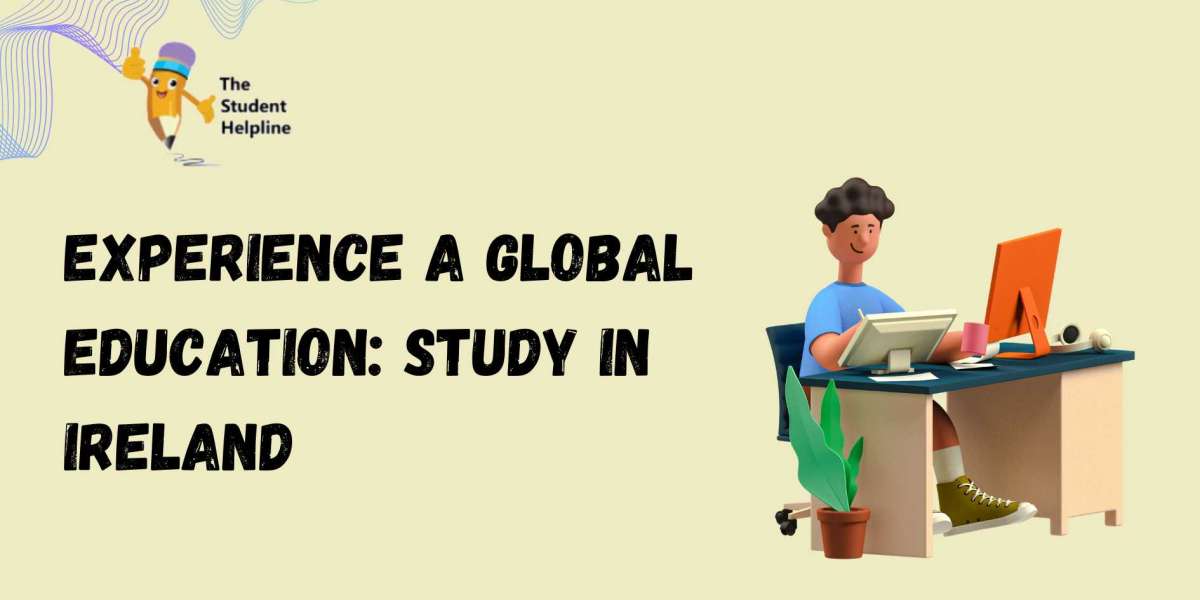Ireland is increasingly becoming one of the most popular destinations for international students seeking a high-quality education and a rich cultural experience. With its top-ranking universities, welcoming environment, and vibrant student life, the study in Ireland journey offers much more than academic excellence. It’s a gateway to a global career, unique life experiences, and an opportunity to be part of a multicultural society.
In this guide, we'll explore why Ireland stands out as a premier study abroad destination, the advantages of studying here, how to apply to Irish universities, and tips for making the most of your academic journey in Ireland.
Why Choose to Study in Ireland?
Ireland boasts a world-class education system, ranking among the top globally for higher education. Whether you're pursuing a degree in business, technology, healthcare, or the arts, study in Ireland promises an enriching academic experience. The country's universities and institutes are known for their research opportunities, industry partnerships, and innovative teaching approaches.
World-Class Universities
Ireland is home to several top-tier universities, including Trinity College Dublin, University College Dublin (UCD), University College Cork (UCC), and National University of Ireland Galway (NUIG). These institutions offer a wide range of undergraduate and postgraduate programs across various fields of study. Irish universities rank highly on the global scale, and their degrees are internationally recognized and respected.
Focus on Research and Innovation
Ireland places a strong emphasis on research and innovation. Many Irish universities and institutes are known for their groundbreaking research in areas like biotechnology, information technology, renewable energy, and pharmaceuticals. By choosing to study in Ireland, you’ll have access to cutting-edge research facilities and opportunities to collaborate with leading experts in your field.
Education System in Ireland
Ireland’s education system is well-structured and student-centered. The curriculum emphasizes independent thinking, creativity, and problem-solving skills, which are essential for global employability.
Types of Degrees Offered
Ireland offers a wide variety of degree programs at both the undergraduate and postgraduate levels. Some of the popular programs for international students include:
- Bachelor's Degrees (3-4 years)
- Master's Degrees (1-2 years)
- PhD Programs (3-4 years)
There are also foundation courses for students who do not meet the direct entry requirements for undergraduate programs. These courses help bridge academic gaps and improve language skills before starting a degree program.
English Language Proficiency
One of the biggest advantages of choosing to study in Ireland is that all courses are taught in English. However, non-native English speakers will need to demonstrate proficiency in the language by taking exams like IELTS, TOEFL, or PTE Academic. Different universities have specific language requirements, so make sure to check those before applying.
The Application Process for Studying in Ireland
Applying to universities in Ireland as an international student involves several key steps, but the process is relatively straightforward. Here's a general overview:
Research and Choose Your Program
The first step is researching the right course and university that aligns with your academic goals and career aspirations. Whether you want to specialize in engineering, humanities, or medicine, Ireland’s institutions offer a wide variety of programs to suit your interests.
Meet the Admission Requirements
Check the specific entry requirements for your chosen course. These may include academic qualifications, English language proficiency, and sometimes additional criteria like standardized test scores (e.g., GRE or GMAT for business and engineering programs).
Prepare Application Materials
You’ll need to prepare several documents, including:
- Academic transcripts
- English language proficiency test results
- Personal statement
- Letters of recommendation
- CV or resume (for postgraduate programs)
Submit Your Application
Most Irish universities accept applications through their online portals. Be mindful of deadlines, as they vary from institution to institution. Typically, the application period for the fall intake (September) starts in the preceding November or December.
Receive an Offer and Apply for a Student Visa
Once you've been accepted into an Irish university, you’ll receive an offer letter, which is necessary to apply for a student visa. International students from outside the EU/EEA will need to apply for a D Visa to study in Ireland. Ensure that you have sufficient funds, health insurance, and all required documentation when applying for your visa.
Scholarships and Financial Aid for International Students
Financing your study in Ireland may seem daunting, but there are numerous scholarship opportunities available for international students. The Irish government, along with various universities and private organizations, offers scholarships based on academic merit, leadership potential, and financial need.
Some popular scholarship programs include:
- Government of Ireland International Education Scholarships
- The Irish Research Council for Postgraduate Research Scholarship
- UCD Global Excellence Scholarships
- Trinity College Dublin Scholarships for International Students
These scholarships can significantly reduce the financial burden of tuition fees and living costs. Make sure to research and apply for scholarships well in advance, as deadlines are often earlier than university application deadlines.
Living in Ireland as an International Student
Apart from offering a top-quality education, Ireland provides a rich cultural experience for international students. The Irish people are known for their friendliness and hospitality, making it easier for students to adjust to their new environment.
Student Accommodation
Most Irish universities offer on-campus accommodation for students, which is highly recommended for first-year students. If you prefer to live off-campus, there are plenty of private rentals available. However, it’s important to secure accommodation early, especially in cities like Dublin, where housing demand is high.
Social Life and Extracurricular Activities
Ireland has a vibrant student life with plenty of clubs, societies, and extracurricular activities. Whether you’re interested in sports, arts, music, or volunteering, there are numerous opportunities to engage with other students and make the most of your time outside the classroom. Irish culture is rich in music, dance, and literature, and students are encouraged to immerse themselves in the local traditions.
Exploring Ireland: A Land of Natural Beauty and History
One of the perks of best study in Ireland is the opportunity to explore its stunning landscapes and historical landmarks. From the rugged Cliffs of Moher to the scenic Ring of Kerry, Ireland is a country of breathtaking natural beauty.
In addition to its scenic countryside, Ireland boasts a rich history. Students can visit ancient castles, cathedrals, and museums to learn more about the country's Celtic and medieval heritage. Plus, Ireland's central location in Europe makes it easy to travel to other countries during breaks, adding to your global education experience.
Conclusion
Studying in Ireland offers a unique blend of academic excellence, cultural enrichment, and career opportunities. From its world-class universities to its welcoming environment, Ireland is a top destination for international students looking to experience a truly global education. By choosing to study in Ireland, you'll not only receive a quality education but also gain lifelong memories, professional connections, and the chance to immerse yourself in a vibrant culture.








